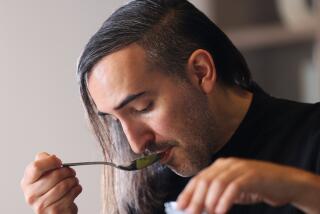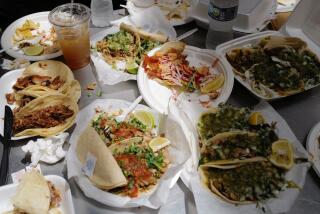That time Padma Lakshmi ate desert woodrat on ‘Taste the Nation’
On the first day of shooting Padma Lakshmi’s new Hulu docuseries, “Taste the Nation,” the cookbook writer and “Top Chef” host found herself sitting with Shamshiri Grill’s imposing block of an executive chef, Hamid Mosavi, as he spoke of fleeing his home in Iran. “He wasn’t into the interview at first,” says Lakshmi of Mosavi, who, as with many of her interviewees, ended up in tears. “He wasn’t exactly warm and cuddly. Then he just unraveled.”
Lakshmi says it was her immigrant rights work with the ACLU that inspired the series, one that examines the cuisine, politics and history of immigrant communities in the U.S., including the Gullah Geechee of the Coastal Carolinas, the Peruvians of Paterson, N.J., and L.A.’s own Persian enclave on Westwood Boulevard. But it’s her foundational understanding of the struggle to assimilate and still preserve your culture, to make a new home in America — she came to the U.S. from India at age 4 — that makes “Taste” more than the sum of its parts.
How quickly was “Taste” greenlighted?
I pitched [it] to seven different networks before I got to Hulu, and they all turned me down. In fact, [an executive from] one of the streamers wrote me a very long email about why they said no.
Which was?
They thought it was derivative. I knew it wasn’t. There are tons of travel food shows, but they’re usually held by men. To me, what was missing in food programming was the cultural context. To look at our country through food as a microcosm to tell a larger American story. I wanted to see food in situ, food that talked about the deep emotional importance it has in our lives. I was seeing it in food writing, but I wasn’t seeing it on TV. So much of food television — including “Top Chef” — is either demonstrational, analytical, dissective or an excuse for self-aggrandizement, for how cool “so and so” is. I wanted to show how interesting and cool these people are that we just walk by in our daily lives, or just grab the takeout package from.
What was the most daunting once you finally started filming?
I was learning on the job. I’m not a journalist per se. I’m a food writer. I was terrified. These aren’t people who’ve gone on media tours or been in front of the camera. The show is predicated on intimacy and I wanted them to tell whatever their story was. So my thing was, “Let them talk. Just listen and ask follow-up questions. Remember that you’re a guest in their house or backyard” or wherever we were.
Did you know that your own upbringing would help you bond with your subjects?
I grew up very blue collar in La Puente [Calif.]. Before that, I lived in Queens. Even when we moved into Manhattan we had subsidized housing because my mom was in management at Sloan-Kettering. I really identify with those people. My mom is a retired nurse, my stepdad is a plumber. I’ve seen how people act one way toward me but another way towards my mom who is just this little old Indian lady crossing the street.
“Taste’s” tone is celebratory. There’s no “Pack your knives and go.” How did that feel?
In one word, it feels great. I’m so alive when I’m doing [“Taste.”] We have 15-hour days. I’m up early. I stay up late because I’m so excited to be at work. I’ve never been this happy professionally in my whole life. It’s taken me this long in Hollywood to get the platform to say what I want in my own words, unfiltered and unedited.
This is definitely a less presentational version of you than the Padma on “Top Chef.” Why?
When I got to Hulu, I said, “I’m tired of seeing women [being] careful about what they say, dressing a certain way, being coquettish. Men get to let it all hang out.” I didn’t want my appearance to be an issue. I wanted that to disappear. I wanted the opportunity to be my full self. I have a potty mouth. I eat till I explode. I have little filter. Like it or not, that’s how it is when you hang out with me.
Because you’re contractually obligated, you try every dish on “Top Chef.” Did you bring that rigor to “Taste”?
I was there to experience what that community eats. Either go there and have the experience as fully as you can or don’t go there.
A rodent known as desert woodrat was on the menu at the San Carlos Apache Reservation.
[Laughs] Believe you me, I was squeamish about it. I was sweating for three days prior. I even stole the salt and pepper shakers on my airplane dinner tray. I felt like, “If it’s really bad, I can put a lot of pepper on it.” But I didn’t need to — it was delicious.
You’ve been renewed for a second season. Talk about the series’ success.
What I can tell you is that my agency sends all its producers reports about what each network is looking for. And what I’ve seen more than once — [including by] one of the networks that turned me down — is, “We’re looking for something like ‘Taste the Nation.’” That gives me immense pleasure.
More to Read
From the Oscars to the Emmys.
Get the Envelope newsletter for exclusive awards season coverage, behind-the-scenes stories from the Envelope podcast and columnist Glenn Whipp’s must-read analysis.
You may occasionally receive promotional content from the Los Angeles Times.










